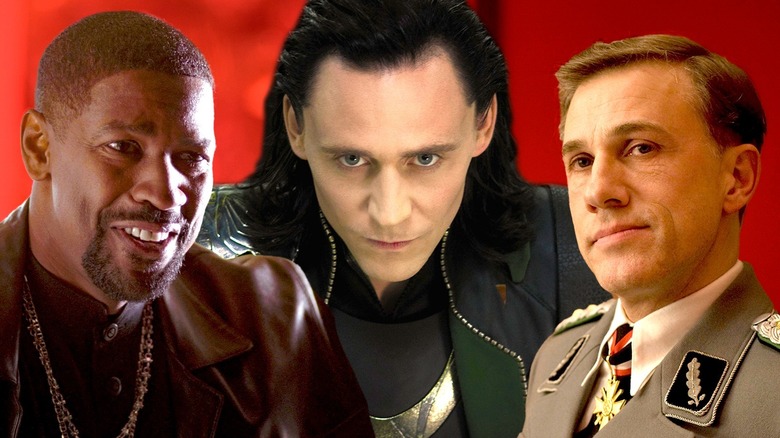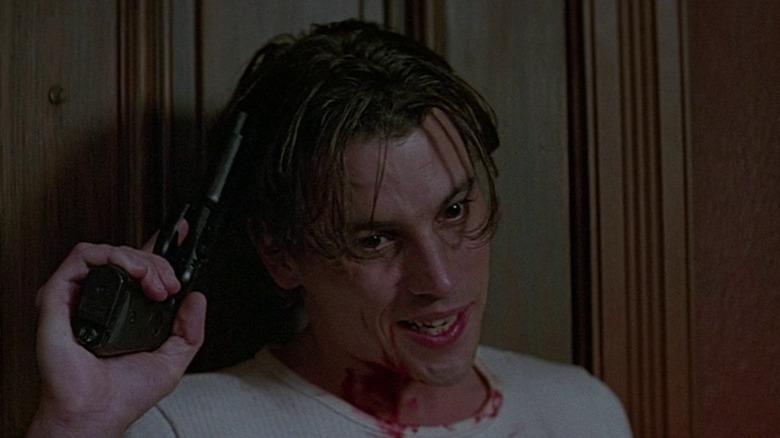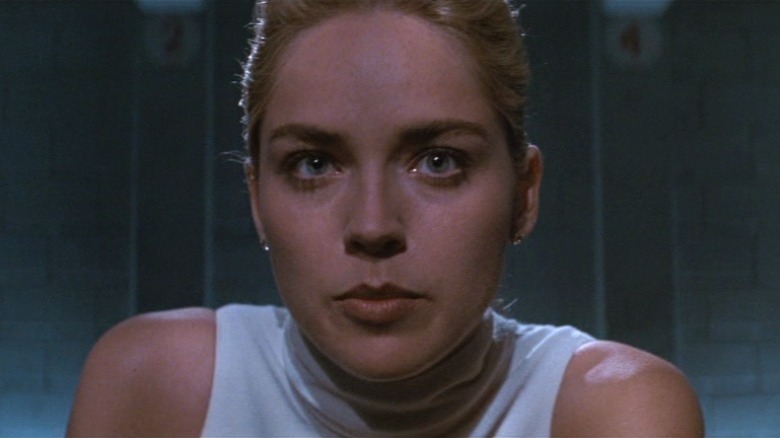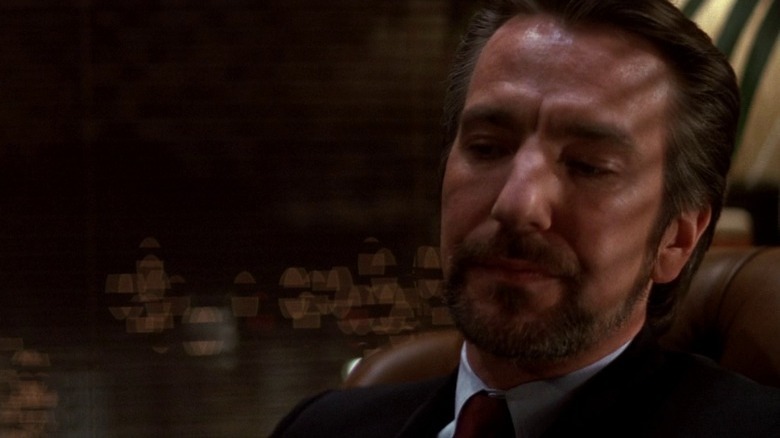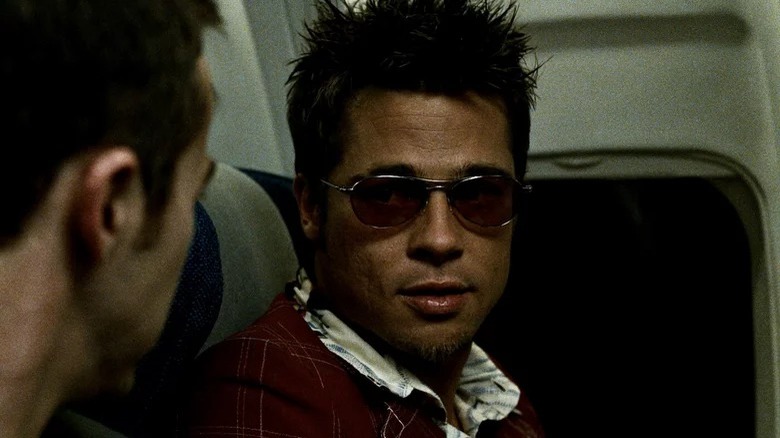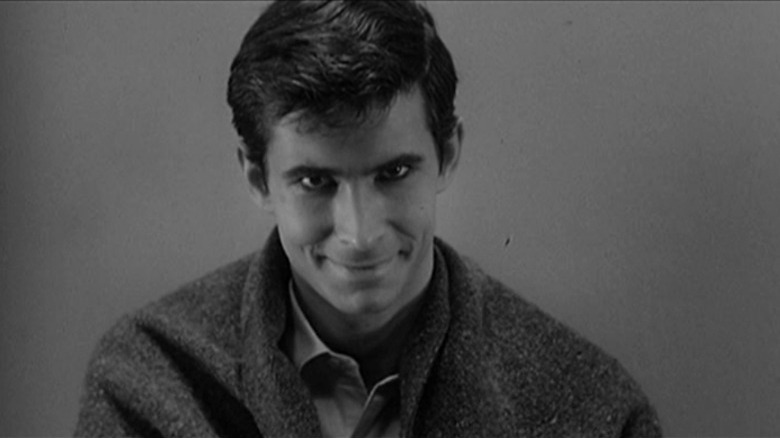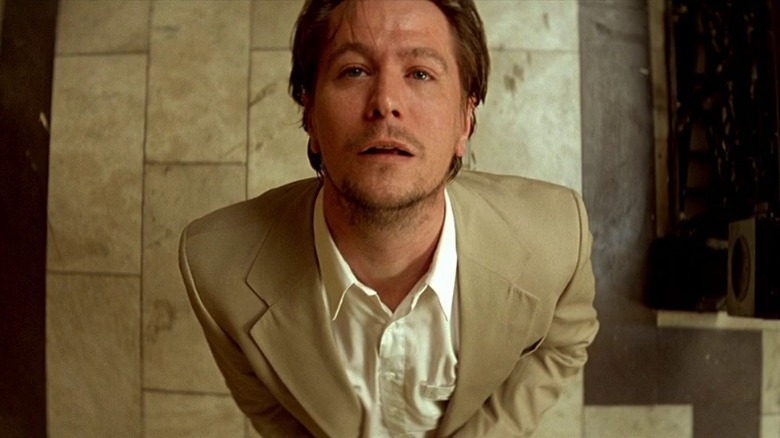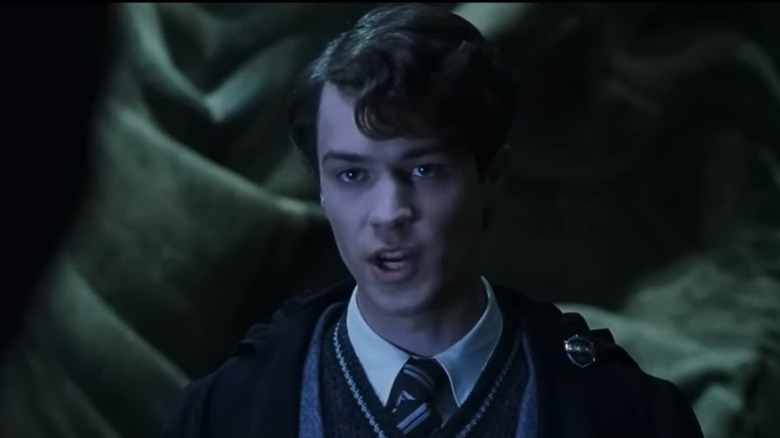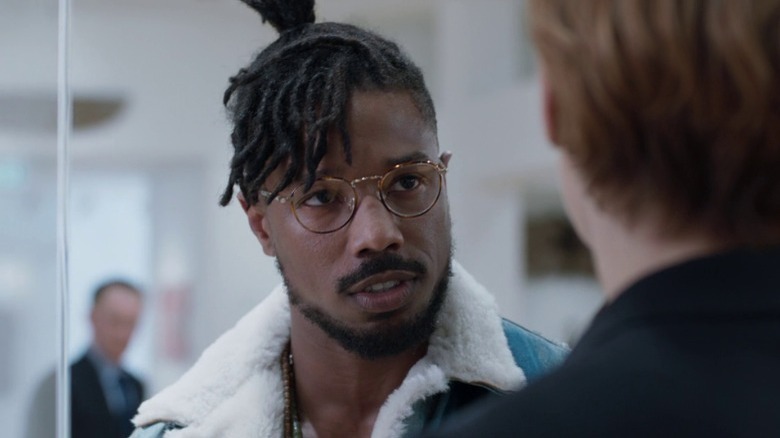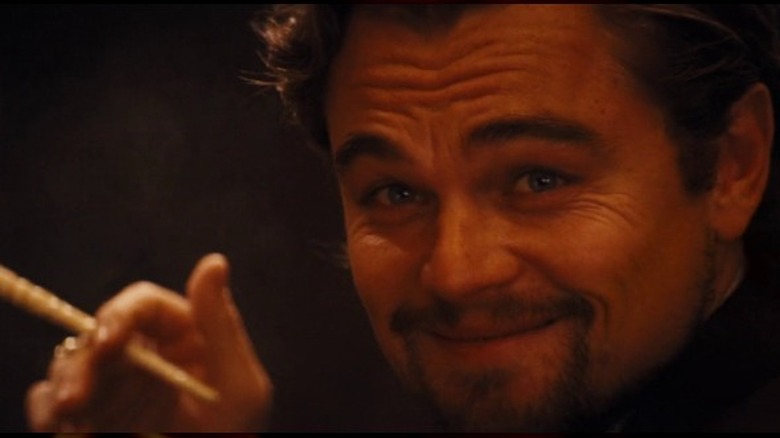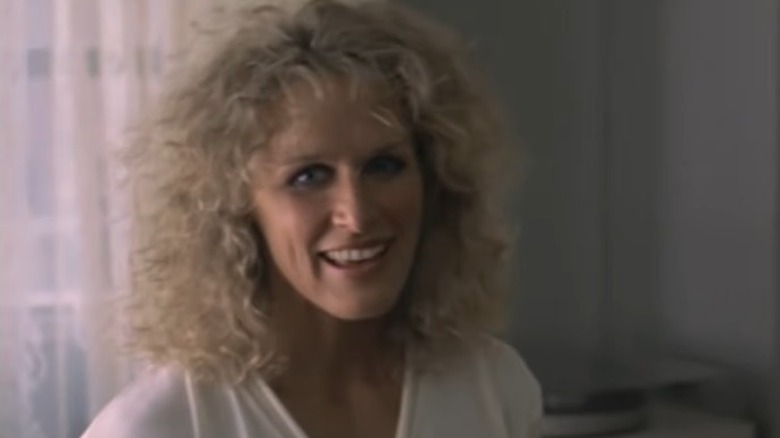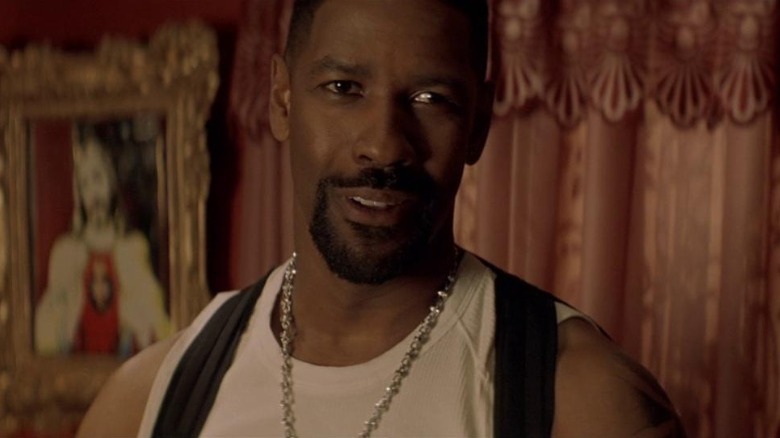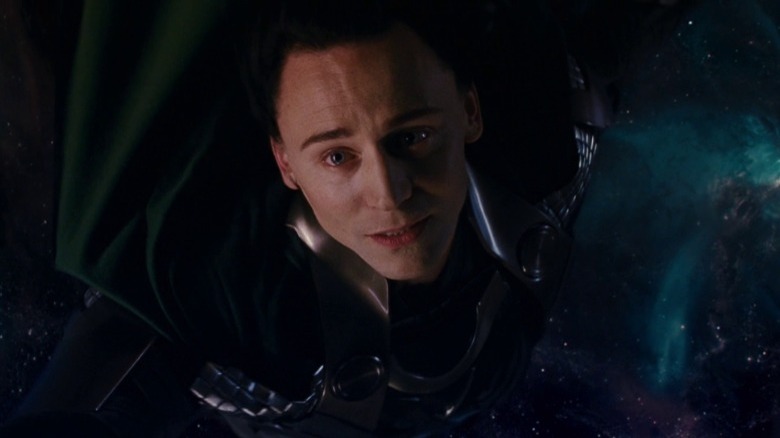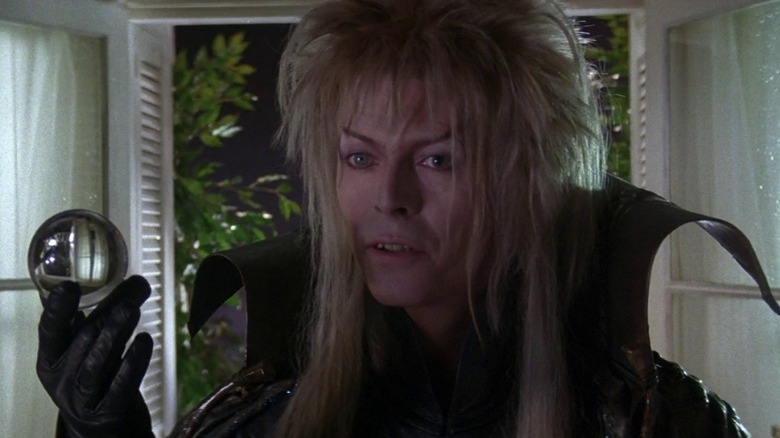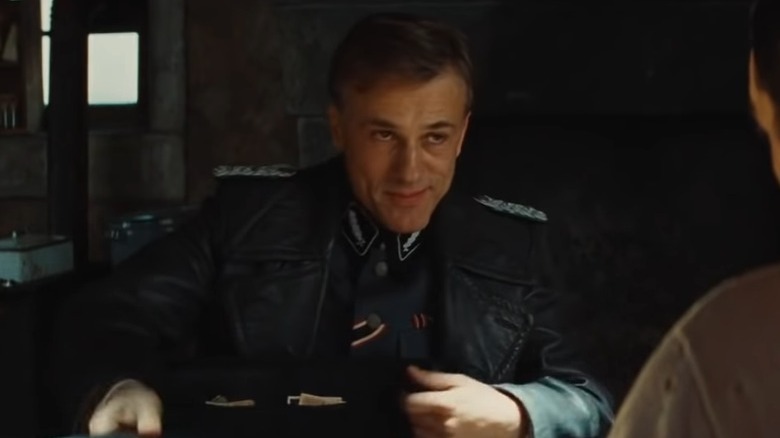The Most Charismatic Villains In Film History
For a movie built on the dynamic between a hero and a villain to work well, there has to be a balance between the two. Where would Batman be without the Joker or James Bond without Spectre? Without an effective villain, all you're left with is a good guy running around without getting into any trouble, and that's incredibly boring. Of course, not every movie can have a great bad guy — there are plenty who are nigh on unwatchable, threatening to derail an entire film.
There are all sorts of bad guys in film history, from loyal goons to megalomaniacal sociopaths, but the best evoke a certain kind of charm. The villains who make the audience root for them, if only for a while, are often attractive, charming, and charismatic. These are the villains who charm people into following them — they inspire devotion in others, and they look good while doing it. A charismatic villain can fascinate the audience (and even the hero sometimes), making you want to watch and see what they'll do next.
Throughout movie history, there have been plenty of outstanding villains, though they aren't all charismatic. Take Superman's greatest foe: Lex Luthor. In "Superman: The Movie," Gene Hackman played him with charm, while Jesse Eisenberg's take on Luthor in "Batman v Superman: Dawn of Justice" was the exact opposite. There are many more like Eisenberg, but the ones found here are more in line with Hackman. They'll charm you right up to the point that they slit your throat with a smile.
Billy Loomis - Scream
When "Scream" premiered in 1996, it was a reinvigoration of the slasher horror genre, and it went on to found an enduring franchise. The film is somewhat self-deprecating of the genre, and there's even a character who points out all the tropes in horror films. "Scream" offers up a new villain in Ghostface, a slasher who enjoys taunting his victims before killing them. At first, Sidney Prescott believes her charming boyfriend, Billy Loomis, is the killer, and he's taken into custody early in the movie.
When Sidney is called while Billy is behind bars, suspicion shifts from him to her father. The movie bats around suspicion from one character to the next, always finding ways of casting doubt at the same time. Billy and Sidney get back together, and by all accounts, he's a delightful young man who couldn't hurt a fly. It's all a case of mistaken identity, and while Sidney is kept guessing who might be the killer, she runs into Billy's arms and hands him a loaded gun.
This isn't a great move, because not only is Billy the killer, but he has a partner: his buddy, Stu. The two frame Sidney's dad for the killings, taunting her all the while. In the end, Billy gets a bullet to the head, putting him down for good, while Stu has a television dropped on his face. Throughout the movie, Billy is loving toward Sidney, and he's pretty charming ... until he isn't.
Catherine Tramell - Basic Instinct
"Basic Instinct" is centered around Catherine Tramell, a wealthy socialite/novelist who is suspected of murder when Johnny Boz is killed with an icepick. Catherine was the last person to see him alive, and the manner of his death was spelled out entirely in her previous novel. When she's taken in for questioning, she becomes sexually provocative with the police and continuously ups her game from there. The lead detective, Nick Curran, becomes enthralled with Catherine, even going so far as to become involved sexually with her, despite being his number one suspect.
Catherine is narcissistic and a pathological liar — two elements often found in villains who charismatically entice others into their orbits. She manipulates events to become a puppet master, where Nick is her marionette. He's suspended from the force, succumbs to his alcoholism, and much more. As the film progresses, suspicion shifts toward Catherine's girlfriend, Roxy, and Beth Garner, a police psychologist who had a romantic past with both Catherine and Nick (at different times).
Ultimately, Nick is left confused over the murder (and those that came before the death of Boz), and he returns to Catherine. They sleep together, and Catherine's hand moves to grab something under the bed, but stops. It's an icepick, and it's clear Catherine can kill Nick, though she chooses not to. Despite this, it's never made clear that Catherine is the killer, leaving the audience to make that determination if they can.
Hans Gruber - Die Hard
Hans Gruber is the central antagonist in "Die Hard," and while he's clearly the villain, he's also the protagonist. As Steven E. de Souza said in a 2015 interview with Creative Screenwriting, he wrote the screenplay with this in mind, which explains much about his character. "Who's the protagonist of 'Die Hard?' It's Hans Gruber who plans the robbery. If he had not planned the robbery and put it together, Bruce Willis would have just gone to the party and reconciled or not with his wife. You should sometimes think about looking at your movie through the point of view of the villain who is really driving the narrative."
Gruber is methodical and ruthless in his desire to obtain the treasure trove of negotiable bearer bonds hidden within Nakatomi Plaza's safe. He'll stop at nothing to get what he wants, but he's not a blunt instrument. He's poised, confident, and stoic — Gruber is also polite to a point, well-dressed, attractive, and exceedingly duplicitous. The expertise with which he slides into his Bill Clay alias to try and thwart John McClane is evidence of this.
"Die Hard" was Alan Rickman's feature film debut, and he played Gruber to perfection. Gruber is often characterized as one of the greatest movie villains of all time, and it's easy to see why. He's demanding and deadly, but he's also likable — you know he's the bad guy, but he draws you in, even making you come close to rooting for him.
Tyler Durden - Fight Club
Brad Pitt's Tyler Durden is one of the most fascinating characters to grace the silver screen in the past few decades. "Fight Club" is an unusual film, to say the least, but it's relatable in many ways, and Durden is the lens that makes this possible. The film tells the story of the unnamed Narrator, played by Edward Norton, and he takes us into the drudgery of his mundane existence, becoming something of a side character in his own narrative. Durden takes the focus of the plot and centers it around himself, often driving the narrative to destructive ends.
Of course, it's revealed in the third act that Tyler Durden doesn't exist — he's an alternate persona of the Narrator, which explains a lot about the film's first two acts. This revelation explains Durden's behavior and establishes him as the Narrator's id, making the entire story incredibly Freudian. This explains why Durden is such a charismatic villain: He's the Narrator's personification of his base impulses — his instincts made manifest, devoid of the super-ego.
Essentially, Durden is the Narrator, utterly uninhibited by societal norms. These qualities are exactly what appeal to everyone who joins the fight club, and, later, Project Mayhem. As Durden, the Narrator recruits dozens of men to his inner circle, forming a cult of destruction that results in the felling of numerous skyscrapers at the film's climax. Durden is the charismatic cult leader who is a necessary antagonist no longer needed at the end.
Norman Bates - Psycho
Alfred Hitchcock's "Psycho" is arguably one of the greatest thrillers in cinema history, and that's largely due to its villain: Norman Bates. That said, Bates isn't the villain in the beginning — the film is brilliantly structured, as it begins with Marion Crane stealing $40,000 from her boss. This establishes the film with Crane as the central protagonist, but that changes rather quickly. She stops for a night at the Bates Motel, a quaint roadside motel operated by the ever-charming Norman Bates.
Bates is an unassuming and attractive young man — he's played by Anthony Perkins, after all. He's also meek and well-mannered; he invites Crane to dinner and disappears long enough to argue with "Mother" in the house overlooking the motel. After this, Crane decides to return the money, but she doesn't get the chance. While showering, Mother pulls open the shower curtain and brutally stabs her to death. This sets the film's narrative in motion, which ultimately reveals the true nature of Bates.
The motel proprietor isn't what he appears, and it's later revealed that Mother doesn't exist — at least, not anymore. Norman killed his abusive mother, but the guilt drove him to mummify her corpse, which he treated as though she was still alive. This resulted in the manifestation of a Mother persona, and when he became attracted to Crane, Mother took over. By the end of the film, Norman's personality has been supplanted entirely by Mother, and he's effectively destroyed, making Mother the true villain of the film.
Norman Stansfield - Léon: The Professional
It takes the brilliant writing and direction of someone like Luc Besson to center a film around an assassin who trains a little girl in his craft and not make him the villain. That's one of the reasons "Léon: The Professional" has been such an enduring film — the main character would be considered a bad guy in any other setting, but in this movie, he's quite the contrary. The bad guy role is taken up by the inimitable Gary Oldman's Norman Stansfield, a DEA Agent who runs his crew as a criminal organization that doesn't police drugs — it sells them.
Stansfield is an unusual villain because he's clearly a dirty cop you can't help but hate, but he's also firmly attached to the characteristics of a charismatic villain. He's attractive, well-dressed, has a sense of humor, and despite his cruel intentions, he's an effective leader. He somehow managed to turn an entire crew of DEA agents against the very thing they swore to do when they joined the force, and you can't do that without some charm.
Granted, a lot of money was on the table, but it's hard to imagine Stansfield not being central to the scheme. When he gets a hold of Mathilda, he exudes a sadistic sense of charm with her, asking her name and addressing her as "Angel." He speaks quietly to her, and while he's overtly aggressive, he has a bizarre sort of elegance. He's charismatic and apologetic, but also menacing and disturbed.
Tom Marvolo Riddle - Harry Potter and the Chamber of Secrets
Lord Voldemort is a lot of things in the "Harry Potter" franchise, but he's not charismatic. He's the opposite — a man who leads through utter fear, gaining the devotion of his followers through malevolence. While that's true of Voldemort, the same cannot be said of Tom Marvolo Riddle, and while he becomes Lord Voldemort, he does so through subterfuge and a pathological form of sociopathy that lets him carve his niche out of the world of witchcraft and wizardry while masquerading as one of its own.
The audience first meets Riddle without knowing who he will become in "Harry Potter and the Chamber of Secrets." His story is told via an enchanted diary Harry finds, which details the events of Hagrid's expulsion from Hogwarts. He's seen as sympathetic to Hagrid and is a kind, attractive young man who cares about his friend. Of course, it's soon revealed that he was responsible for the student's death, blamed on Hagrid's pet, Aragog, who later claims his innocence to Harry and his friends.
When Harry enters the Chamber of Secrets, he finds Riddle standing over Ginny's unconscious body and sees him as a friend. This proves untrue when Riddle reveals that his name is an anagram of "I am Lord Voldemort" and Harry's archenemy made manifest via the diary. He explains his villainous plot, mentioning, "I can be very persuasive." Riddle's charisma was entirely the result of his purpose — "to finish Salazar Slytherin's noble work."
Erik Killmonger - Black Panther
In the comics, Erik "Killmonger" Stevens isn't the most sympathetic character — at least, not like he is in "Black Panther." The film depicts Killmonger in much the same way as he is in the comics: He's a ruthless mercenary who begrudges the Kingdom of Wakanda for his parents' deaths. But in the movie, he's played by Michael B. Jordan, and he's a far more sympathetic character than he is in the pages of Marvel Comics, something that has more to do with Jordan's acting abilities than it does with the words in the script.
Jordan plays Killmonger as someone who is relatable despite being a methodical killer who will stop at nothing to achieve his goals. The man is relentless, and when he claims his noble right to the throne, most of Wakanda bends the knee. While this is initially done out of custom — Killmonger did beat T'Challa in combat — many remain because of who he is. He's a charismatic leader, and it doesn't take much effort for Killmonger to build devotion in his followers.
This ultimately results in a civil war between the forces devoted to him and those supporting T'Challa, but it's hard to ignore the fact that Killmonger did have his own sizable following. In the end, T'Challa delivers a mortal blow, but he honors his cousin's desire to be buried at sea and sits with him as he dies, looking at the beautiful Wakandan sunset. He also implements his plan to release Wakandan technology to the world — albeit with less death and destruction.
Calvin Candie - Django Unchained
"Django Unchained" tells the story of the eponymous slave-turned-bounty hunter, Django (Jamie Foxx). Django is saved by Dr. King Schultz, who needs him for a job and keeps him on, promising to help Django find his wife. This ultimately takes the pair of bounty hunters to Mississippi, where they learn that his wife, Broomhilda, is one of the slaves at Candyland, a plantation owned and operated by Calvin J. Candie. Leonardo DiCaprio plays Candie and puts every bit of acting effort into depicting him as equal parts charming and cruel.
While these two traits would otherwise cancel one another out, DiCaprio manages cruelty with a smile, and Candie is one of those villains you want to watch, but you're also rooting against. Candie negotiates for the sale of Broomhilda, first with gentlemanly resolve, but then transitions into brutality, abandoning his southern charm and hospitality for a more direct approach. He comes to an accord with Dr. Schultz, but he pushes him just a bit too far.
Upon insisting they conclude their deal with a handshake, Shultz cannot suppress his desire to kill him and shoots him in the heart. Candie's death reveals just how much his men loved him, but not only that, his head house slave, Steven, is utterly bereft when he sees his master die. Candie's ruthless and inhumane treatment of his slaves and his charismatic appeal to his men are both antithetical and accommodating to one another, making him an incredibly unusual yet appealing villain.
Alex Forrest - Fatal Attraction
In "Fatal Attraction," Dan Gallagher meets a woman named Alex Forrest through his work, and this happens to be at a time when his wife and daughter are out of town. The two sleep together, understanding that their affair is nothing more than a fling. Or at least, that's how Gallagher feels about it. Forrest, on the other hand, gets a bit ... clingy. She first gets him to spend the day with him, and when he tries to leave, she self-harms in an effort to force him to stay.
That's a red flag if there ever was one, but Gallagher tries to settle things down and remains with her for the night. From there, Forrest's attractive qualities diminish considerably as she begins a massive manipulation scheme to claim Gallagher as her own. She calls him at all hours and even goes down the fake pregnancy route. Finally, there's a point when she goes a bit too far, showing up at his apartment to meet Dan's wife, Beth.
The two get along splendidly, but things go from bad to utterly horrific rather quickly. The thing about Forrest that makes her such a good villain in the film is her charm. She's initially very alluring, and you can almost forgive Gallagher for sleeping with her. He soon learns the error of his ways, but only because Forrest is a master manipulator capable of pretty much anything, including boiling a bunny alive.
Alonzo Harris - Training Day
Denzel Washington absolutely earned his Academy Award for best actor for his portrayal of Detective Alonzo Harris in "Training Day." The actor pulls out all the stops in his depiction of a dirty narcotics officer working in the LAPD. The film is set over the course of 24 hours, beginning with the first day of training for Officer Jake Hoyt. Harris is highly decorated, and training with him is an excellent opportunity for the young detective. He realizes the error of this assumption when Harris forces him to smoke pot at gunpoint because refusing to do so on the street would get him killed.
The day's events follow the two officers as Harris continues his shady behavior. He steals $40,000 with a fake search warrant and executes a man to steal more money. All of this is meant to save him from the Russian Mafia, and he uses his many connections in the underworld to set up Hoyt and keep himself safe. This ultimately backfires in Hoyt's favor when Harris arranges his execution, but the would-be killers stop when they learn that Hoyt saved one of their cousins.
Harris is an oddly charismatic man who commands a great deal of respect from the criminal underworld. Much of this is bought through fear, but there's clear evidence that he's a commanding presence amidst the various gangs in his territory. Of course, this unravels at the film's climax, and he's eventually thrown to the wolves by those who followed him.
Loki Laufeyson - The Marvel Cinematic Universe
Loki has been in Marvel Comics for decades, and it's only recently that the character has been somewhat reformed as an anti-hero. For most of his history, he was an absolute villain, but this isn't entirely true in the Marvel Cinematic Universe. In the MCU, Loki is revealed as the antagonist in "Thor," though he's not entirely devoid of charm. Loki is a lot of things: He's manipulative and dastardly, but he's also regal and charming. He's humorous, attractive, and alluring but also conniving and duplicitous — essentially, he's always more than he appears.
In his second appearance, he's the big bad in "The Avengers," and he exudes all of these characteristics. Over time, he becomes far more nuanced, and the character manages to score two redemption arcs. In the normal timeline of the MCU, he attempts to save his brother, Thor, and dies as a result. He's redeemed in death and is remembered as a hero. Loki gets another shot at life, thanks to some time-travel shenanigans, and the entire storyline of "Loki" is his redemption.
The series is entirely about Loki and shows who he is at his core. He's got a lot of chips on his shoulders, but he's also a sympathetic man who grew up in the shadow of greatness. Loki is ever-charming and capable of commanding followers, so he's clearly charismatic. However, he often puts his charisma to work for his villainous schemes rather than push their use as a hero.
Jareth - Labyrinth
In 'The Labyrinth," Sarah wishes for the Goblin King to come and take her brother Toby away, and he does precisely that. While Sarah doesn't expect anything to truly happen, Jareth the Goblin King manifests in her home and takes Toby to the center of his Labyrinth, telling Sarah she can rescue him, but setting up several hindrances along her path. The film plays out Sarah's quest, and she meets several interesting and helpful allies along the way. Through it all, Jareth watches and manipulates events in his favor, frustrating Sarah.
While Jareth is the antagonist of Sarah's adventure, he's not your typical villain. He may be the Goblin King, but he doesn't look it: He's attractive and captivating. Granted, he's played by David Bowie, so you get what you pay for. He's also the enigmatic leader of a horde of faithful goblins, who would do anything for him. Jareth is charismatic and magnetic — he draws you in, making you want to see more and more of him throughout the film. Any moment he's off-camera is one in which you long to see his return.
At the film's conclusion, Sarah engages Jareth in an M.C. Escher-esque scene in which she finally realizes he has no power over her. This ultimately defeats Jareth, ensuring Sarah can return home with Toby. It's a brilliant ending because it undermines Jareth's power, which is his charismatic ability to force others to do his bidding.
Hans Landa - Inglorious Basterds
"Inglorious Basterds" is an alternate history take on several true events during World War II, and it features numerous antagonists. The Nazis, Hitler, his minions, and many others are ancillary antagonists, but if you had to identify a central villain, it's Standartenführer Hans Landa, played by Christoph Waltz. In his Academy Award-winning portrayal of the brutal bad guy, Waltz employs a master class of acting, showing his ability to elicit charm and charisma while maintaining a menacing presence that puts everyone else in the scene on edge.
In his opening scene, he drops by a dairy farm and charmingly engages with three young women and their father. He speaks to him plainly, first downing his offered milk and praising him and his daughters. The tension is palpable, but you couldn't tell from Landa's demeanor — he's pleasant, complimentary, and accommodating. He's also one of the most intimidating characters to ever grace the silver screen, and the scene concludes with him murdering a family of cowering Jews hiding beneath the floorboards.
Throughout each of his scenes in the movie, Landa is brutal and bewildering. His particular form of psychopathy keeps the audience on the edge of its seat, and while you know he's an evil man, you can't help but hope he sticks around so you can enjoy his presence on the screen.
